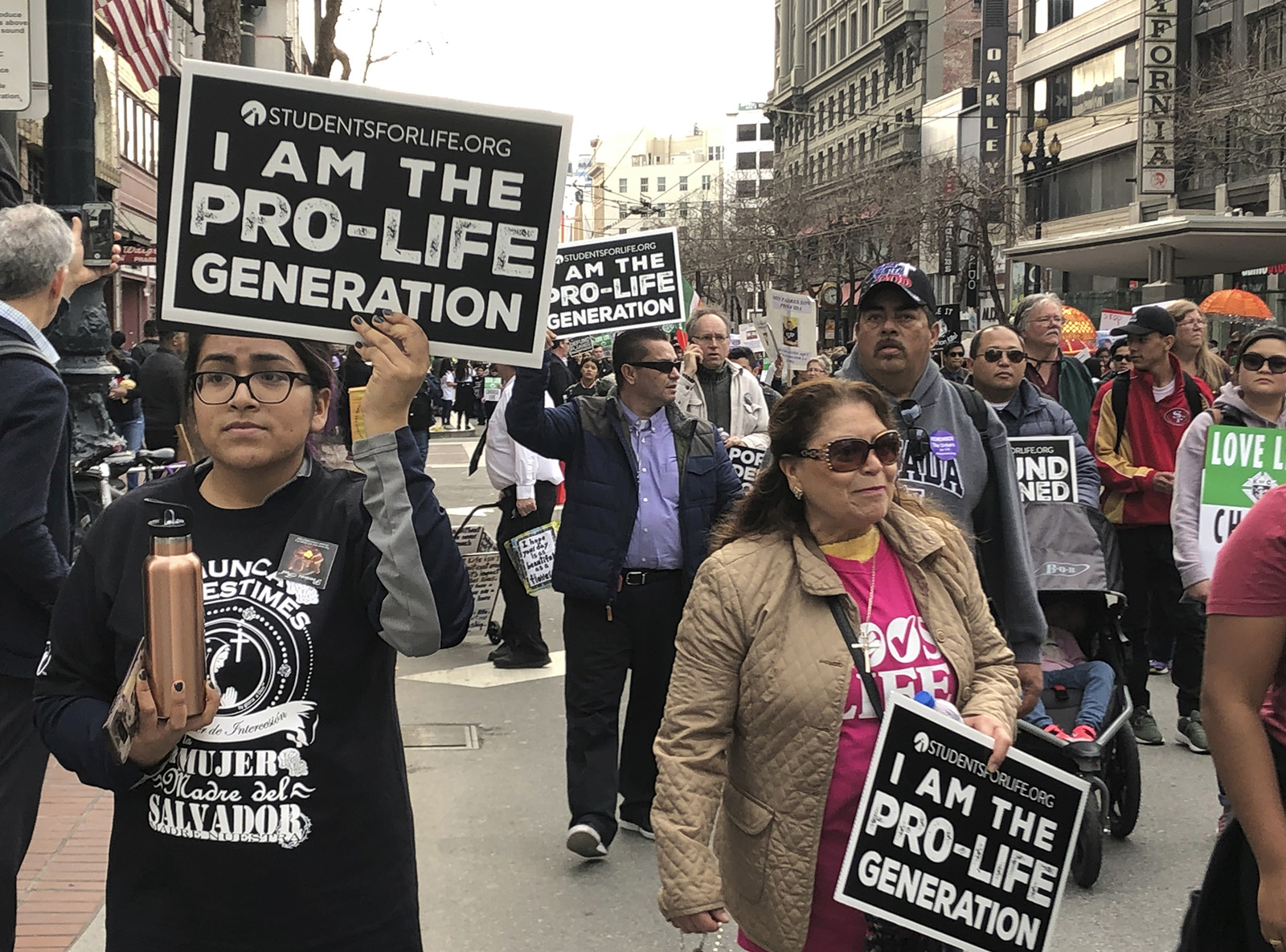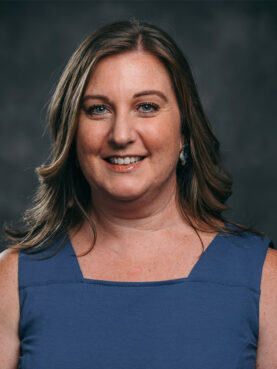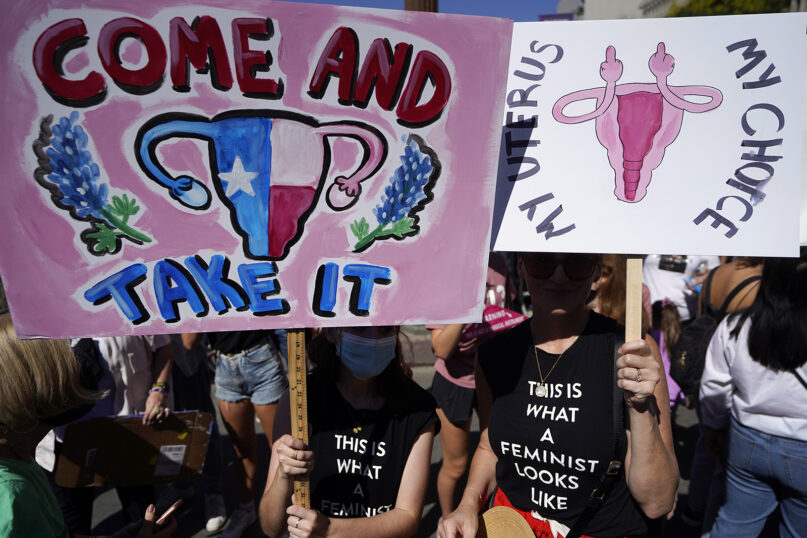(RNS) — As California aims to become a sanctuary for out-of-state patients seeking abortions, Kathleen Domingo, executive director of the California Catholic Conference, is calling on Catholics to recognize this as “our moment.”
“We’re in a position here in California where we really have a fight on our hands,” Domingo told Current News, a Catholic news TV show, on Monday (Dec. 20).
Domingo sees this as a moment for Christians to unite in support of local pregnancy resource centers and life-affirming pregnancy clinics and for Catholic parishes to reach out to families and women in need.
“This is just the time for our Catholic community to do more of what we’ve always done and to be very intentional about the fact that we are helping people,” Domingo told Religion News Service. “We are equipped to be able to do that.”
RELATED: As Supreme Court debates abortion, dueling theologies protest outside
Expecting a rush of pregnant people seeking abortions to flood into California if the U.S. Supreme Court overturns Roe v. Wade, the California Future of Abortion Council, which consists of more than 40 abortion providers and advocacy groups, released a list in early December of 45 recommendations for the state to, as Gov. Gavin Newsom said, “support that inevitability.”
“We’ll be a sanctuary,” Newsom said.
Newsom has said some of the report’s details will be included in his budget proposal in January.
The report recommends funding — including public spending — for travel, lodging and child care expenses for those seeking abortion in the state, as well as reimbursing abortion providers for services to those who can’t afford to pay.
Advocates want to expand the number of abortion providers with the proposed California Reproductive Scholarship Corps, open to those training as physicians or nurse practitioners in underserved areas in the state. They also want to require primary care and family medicine education programs to provide training in abortion care.

Thousands of abortion opponents march in the 15th annual Walk for Life across downtown San Francisco on Jan. 26, 2019. The event, which included a Roman Catholic Mass and a rally at Civic Center Plaza, was held close to the 46th anniversary of the U.S. Supreme Court’s Roe v. Wade decision that legalized abortion. (AP Photo/Juliet Williams)
The report also seeks to assess gaps in abortion access in areas of the state primarily served by religiously affiliated hospitals and health systems, stating patients “must be able to access a full spectrum of health care,” including abortion, contraception and gender-affirming care, that “they need and deserve regardless of where they receive their care.”
Abortion providers and allies aim to enact legal protections for abortion patients and providers and combat what they say is misleading abortion information perpetuated by so-called crisis pregnancy centers.
The abortion council’s report cited “The Alliance: State Advocates for Women’s Rights and Gender Equality,” an investigation of crisis pregnancy centers in seven states, including California. It found that “sexuality-related content in (crisis pregnancy center) programs sometimes featured religious and shame-based messages, as well as harmful stereotypes about women, LGBTQ+ youth, and nontraditional families.”
While some Christian leaders and organizations in the state are condemning the list of recommendations, other out-of-state faith leaders are applauding California’s abortion sanctuary plans.
RELATED: In Texas, ‘Reproductive Freedom Congregations’ catch on as new abortion law looms
To the Rev. Amelia Fulbright, who pastors the Congregational Church of Austin, hearing about California’s plans to make it easier for out-of-state people to access abortion care brought a sense of relief.
“Anything that can be done to make it easier for pregnant people to access abortion care when they need it, is welcome at this point,” said Fulbright.
Fulbright is among a number of faith leaders advocating for reproductive health care access in Texas, where a new law allows anyone to sue those who help a pregnant person get an abortion after six weeks of pregnancy.
“In Texas, we have a state abortion fund and we have clergy who are helping people get to nearby states where they can get abortion care, but we’re hearing that nearby states are already feeling strained by the extra patients coming from Texas,” added Fulbright.
Fulbright believes it’s crucial that people of faith reclaim the public discourse around reproductive health from what she sees as “the grip of patriarchal religion and politics.”
But to Domingo, the abortion council’s recommendations are “disappointing and deceptive.”
Soon after the California Future of Abortion Council released its report, Domingo issued a lengthy statement on behalf of the California Catholic Conference, highlighting how “most egregiously, the report calls for violating conscience protection for medical students by forcing them to be trained in abortion procedures.”

Kathleen Domingo. Photo via California Catholic Conference
“And, it seeks to force Catholic healthcare to either offer abortions or go out of business, particularly in remote regions where Catholic hospitals provide services for some of the most underserved people in the state,” Domingo detailed in her statement.
Christian groups are also rallying around the state’s estimated 160 pregnancy resource centers, many of which are near abortion clinics, in hopes people might seek their counseling before choosing abortion.
Jonathan Keller, president and CEO of the California Family Council, told The Associated Press that about half of the state’s pregnancy resource centers are medical clinics, while the rest are faith-based counseling centers.
Keller said many of these centers are already planning on increasing their staffing if California gets an influx of patients.
On Tuesday, the California Family Council, an organization aiming to advance “God’s design for life, family and liberty,” held a webinar to stop what it described as “Newsom’s ‘Abortion Sanctuary’ Scheme.” Panelists condemned the report, calling it “abortion tourism” and referring to those who are part of the California Future of Abortion Council as “extremist groups.”
Allison Martinez, executive director for the California Alliance of Pregnancy Care, participated in the panel and said pregnancy centers and clinics are “a valuable commodity in our communities” that offer same-day pregnancy tests and ultrasounds within the same week.
The California Alliance of Pregnancy Care aims to “promote life affirming alternatives to abortion” and in its website said it advocates for reproductive justice in California.
“Our hope is to unify the centers and clinics throughout our state so that we can have a voice in Sacramento,” Martinez said.
David Bereit, a Catholic anti-abortion strategist, urged during the panel that people should be involved by becoming “sidewalk advocates,” by beginning Students for Life chapters at their schools and by participating in March for Life events.
Bereit said that, while ending abortion might seem impossible, “with God, all things are possible, so we need to pray.”
The Associated Press contributed to this report.





